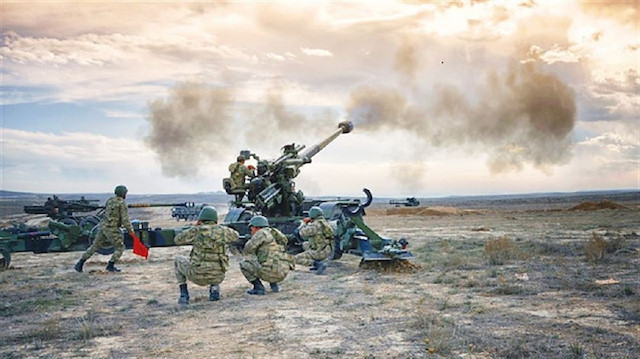
Turkey's National Security Council also reiterates country will continue determined fight against terror group Daesh/ISIS
Operation Peace Spring, launched last month, “which contributes to peace and stability in the region, will continue until it reaches its goals, while taking all precautions to prevent harm to civilians,” the council, chaired by Turkish President Recep Tayyip Erdogan, said in a statement after meeting at the presidential complex in Ankara.
The council also said that Turkey expects the U.S. and Russia to fulfill their agreements with Ankara as soon as possible to clear terrorists from areas of northern Syria, including Tal Rifat and Manbij.
The council reiterated that Turkey will continue its determined fight against the terror group Daesh/ISIS and is open to any cooperation towards that end.
“We call on the international community to support Turkey, which aims for the safe and voluntary return of Syrians to their country without any discrimination based on ethnicity or religion,” the council also said.
Turkey on Oct. 9 launched Operation Peace Spring to eliminate YPG/PKK terrorists from northern Syria east of the Euphrates River in order to secure Turkey’s borders, aid in the safe return of Syrian refugees, and ensure Syria’s territorial integrity.
Ankara wants YPG/PKK terrorists to withdraw from the region so a safe zone can be created to pave the way for the safe return of some two million refugees.
Under two separate deals with the U.S. and Russia, Turkey paused the operation to allow the withdrawal of YPG/PKK terrorists from the planned northern Syria safe zone.
But the terrorists have failed to withdraw from some areas and continue to attack both soldiers and civilians.
In its more than 30-year terror campaign against Turkey, the PKK -- listed as a terrorist organization by Turkey, the U.S. and EU -- has been responsible for the deaths of 40,000 people, including women, children, and infants. The YPG is the PKK's Syrian offshoot.
- 1915 claims
Turkey's position on the events of 1915 is that the deaths of Armenians in eastern Anatolia took place when some sided with invading Russians and revolted against Ottoman forces. A subsequent relocation of Armenians resulted in numerous casualties.
Turkey objects to the presentation of the incidents as "genocide" but describes the events as a tragedy in which both sides suffered casualties.
Ankara has repeatedly proposed the creation of a joint commission of historians from Turkey and Armenia plus international experts to examine the issue.
Hello, the comments you share on our site are a valuable resource for other users. Please respect other users and different opinions. Do not use rude, offensive, derogatory, or discriminatory language.
The floor is all yours.








